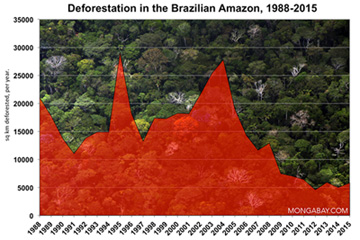Environmentalists and loggers like new Amazon logging law
Environmentalists and loggers like new Amazon logging law
Environmentalists, Loggers Offer Guarded Praise for Brazil Forestry Law
By Michael Astor, Associated Press
March 25, 2007
RIO DE JANEIRO, Brazil — New rules that allow sustainable logging of national forests in the threatened Amazon drew guarded praise from both environmentalists and loggers.
President Luiz Inacio da Silva this week issued rules to carry out the law, passed last year by Congress, that opens national forests to use by private companies and citizens.
Officials are supposed to create a registry of all public lands in the Amazon region and the National Forestry Service will then determine which areas can be opened up for concessions.
Loggers will have to present a plan for sustainable management that preserves the forest while allowing commercial profit from it.

DEFORESTATION IN BRAZIL: 60-70 percent of deforestation in the Amazon results from cattle ranches while the rest mostly results from small-scale subsistence agriculture. Logging results in forest degradation but rarely direct deforestation. However, studies have showed a close correlation between logging and future clearing for settlement and farming. |
“We see more positive points than negative points in the decree,” Marcelo Marquesini, a senior campaigner for Greenpeace, said Thursday. “Success or failure of this public policy will depend on monitoring and enforcement. If there is no enforcement it will not work.”
At least some loggers agreed.
“It’s a good move if everybody follows the law, but if some people are logging responsibly and others aren’t, it won’t work. I can’t compete with those who log without a management plan they can sell wood for a fifth of the price that I do,” said Marcelo Sobral, a logger from the southern state of Curitiba with holdings in the Amazon rain forest.
Brazil is home to the vast bulk of the Amazon rain forest and in recent years the country has struggled with how to balance the region’s development with preservation.
Farmers and ranchers are increasingly making inroads into the world’s largest remaining tropical wilderness, threatening the region’s environment, but also creating jobs for the millions of poor people who live in the region.
So far about 20 percent of the Amazon’s 1.6 million square miles rain forest has been cut down, mostly to make way for pasture and grain fields.
Associated Press
Brazil to allow large-scale monitored harvesting of the Amazon. The International Tropical Timber Organization (ITTO) reports the Brazilian government plans to allow large-scale monitored harvesting of the Amazon rainforest. The new plan expands on an initiative proposed last year by Brazilian president Luiz Inacio Lula da Silva that would allow sustainable logging across 3 percent of the Amazon rain forest.
Amazon to be logged sustainably says Brazil. Last week Brazilian president Luiz Inacio Lula da Silva announced a plan to allow sustainable logging across 3 percent of the Amazon rain forest. The law is aimed at undermining destructive illegal logging activities—currently responsible for most of the commercial timber extraction in the region—while generating revenue for forest management and protection, and income for rural Brazilians in the region who often must rely on subsistence agriculture or employment on ranches and plantations under sometimes slave-like conditions.
“Stealth logging” doubles amount of rain forest disturbance in the Amazon. Research released earlier this month in Science found that Brazil’s Amazon rain forest is being degraded twice as fast as deforestation figures suggest. Selective logging, where only one or two valuable tree species are harvested from an area, is driving the forest degradation. The findings have important implications for “sustainable harvesting” schemes that have been promoted as ecologically-sound alternatives to traditional harvesting techniques.